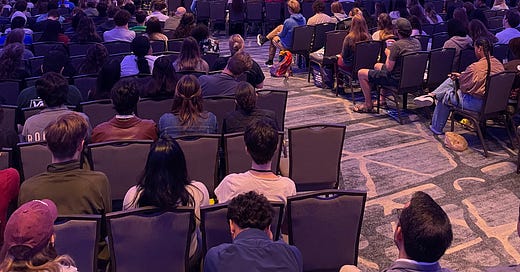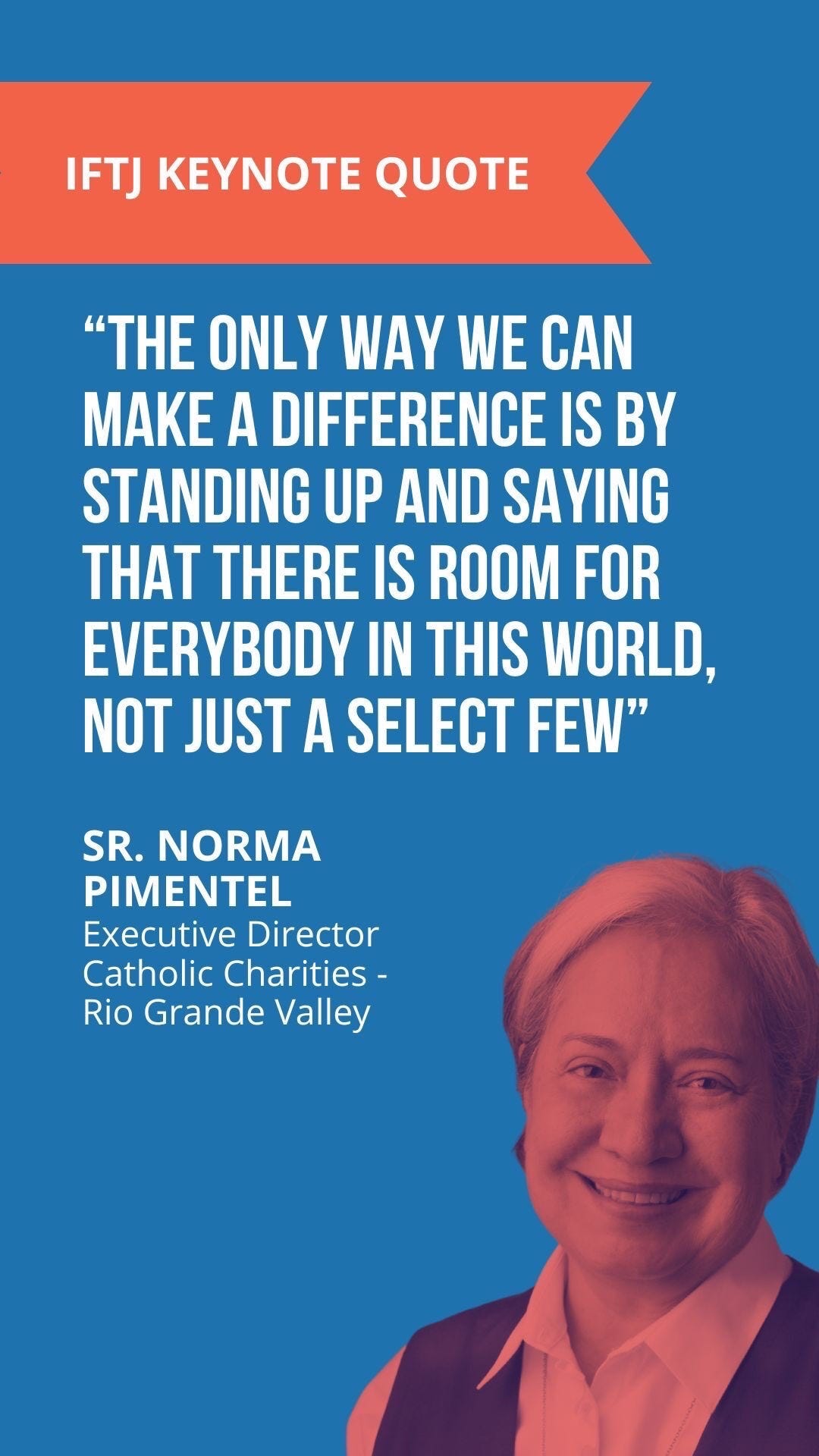I’m a late bloomer to the Jesuit world and Ignatian spirituality. I was 30 the first time I ever heard of either one of those things. Since then, I’ve been making up for lost time. Several years ago, I started seeing posts about the Ignatian Family Teach-in for Justice, and I thought, “Oh, THAT is where I want to be.”
This year, I finally got my chance. IFTJ, put on by the Ignatian Solidarity Network, is an event that was started twenty-six years ago in response to the martyrdom of six Jesuits and two laywomen at the University of Central America in El Salvador. For the first nine years of the gathering, it took place in a tent on the banks of the Chattahoochee River in Columbus, Georgia, near the gates of Fort Benning. Part of the event was a public witness at the School of the Americas, where those responsible for much of the violence in Central America were trained, with explicit US Support. Now it is held in Washington, DC so that attendees can participate in a public witness at the Capitol and arrange meetings with their elected officials.
It was a dream to be there, to imbibe the hope in the air, the commitment to justice. It was a dream to be able to speak to so many inspiring people and organizations in person. It was a dream to see dear friends and collaborators and to enjoy the exuberant dad energy of my friend Brother Ken Homan, SJ, who was the event emcee (it really did feel like a family reunion!). It was a dream to hear my heroes speak. It was a dream to be surrounded by people who care so deeply about the things I am thinking about every waking moment.
At the beginning of each group session, musician Francisco Herrera would call us together with his sonorous voice, singing, “Caminando, caminando.”
“We are walking together.”
And, of course, I thought back to one of my first grad school classes, where we learned about Benedict Anderson’s concept of imagined community, especially as it applies to the readership of print media (it turns out that this was very important in nineteenth-century Russia, the period we were studying.) I thought about my own imagined community, the one I take part in while writing prayers on my couch, tapping out articles at the dining room table, reading in bed each night before I go to sleep. I knew all these wonderful people existed because I read their work, I saw their photos, I held their publications in my hands. But here they became real, in the flesh, right alongside me. It was powerful.
Let me tell you my absolute favorite part of IFTJ: I have never heard so much truth-telling in a Catholic space as I did this past weekend. I have never been in a more diverse Catholic space, crowded with two thousand high school and college students from dozens of Jesuit institutions. It did my heart so much good to see young leadership on the most pressing justice issues of our time.
But do you know what gave me the most hope? The older people: the nuns, the priests—including one from El Salvador—and the laypeople who have been part of this work for decades and decades. They were a powerful reminder of the long, long arc of history, which, as Dr. King reminds us, bends toward justice. But the older folks were also a powerful repudiation of a false notion that we cling to: that all the ills that plague our society—racism, misogyny, homophobia, xenophobia, and more—are just “how things were back then.” Every white head of hair I saw last weekend answered, “Absolutely not.”
“Justice work,” theologian and activist Fr. Bryan Massingale said to us, “is a relay race.” How powerful it was to see the baton being passed from generation to generation, right before my eyes.
The unjust attitudes and beliefs that flow through our country like water are not, our elders show us, inherent traits. They are taught. They are learned. We are responsible for what we pass on to our children, for how we teach them to be present and engage with the world. We are responsible for teaching them to be siblings to all people. We are responsible for ushering them into beloved community.
This past weekend was an incredible feast. I came home with a full heart and a full cup. If you want to watch the talks, you can find them here.
A Few Hopeful Things
-I have to start with this incredible news from my dear friend Laura Kelly Fanucci. NO! CANCER! Crying and dancing and basking in this unexpected joy.
-Sometimes in life you are lucky enough to get to interview your heroes. I was just such a lucky duck when I got to speak to Christine Valters Paintner of Abbey of the Arts about her new book, The Love of Thousands: How Angels, Saints, and Ancestors Walk with Us Toward Holiness for NCR. It’s such a perfect time, during the month of the holy souls, to turn our eyes toward those who came before us and walk alongside us. You can read the interview here.
-One of the breakout sessions I attended at IFTJ was on parenting, led by my friend John Doughterty. It was so moving hearing everyone’s stories. Holy listening. It made me excited for the virtual parenting retreat I am leading next weekend for the Ignatian Spirituality Center. You can sign up here.
Walking together with you,
Cameron







Cameron, I just found your Substack, and I'm excited to follow your adventures! I have been admiring ITFJ from afar for years, and it's wonderful to read your reflection. I love your hopeful note about the white-haired heads in the room - yes!
Cameron! This event sounds incredible, thanks for sharing all that goodness. And imagined community 🤯 What a helpful concept to understand parasocial and social-social belonging and connection in these current communication structures. Do you have a recommended place to start with Anderson? You know your girl loves an academic article 😎